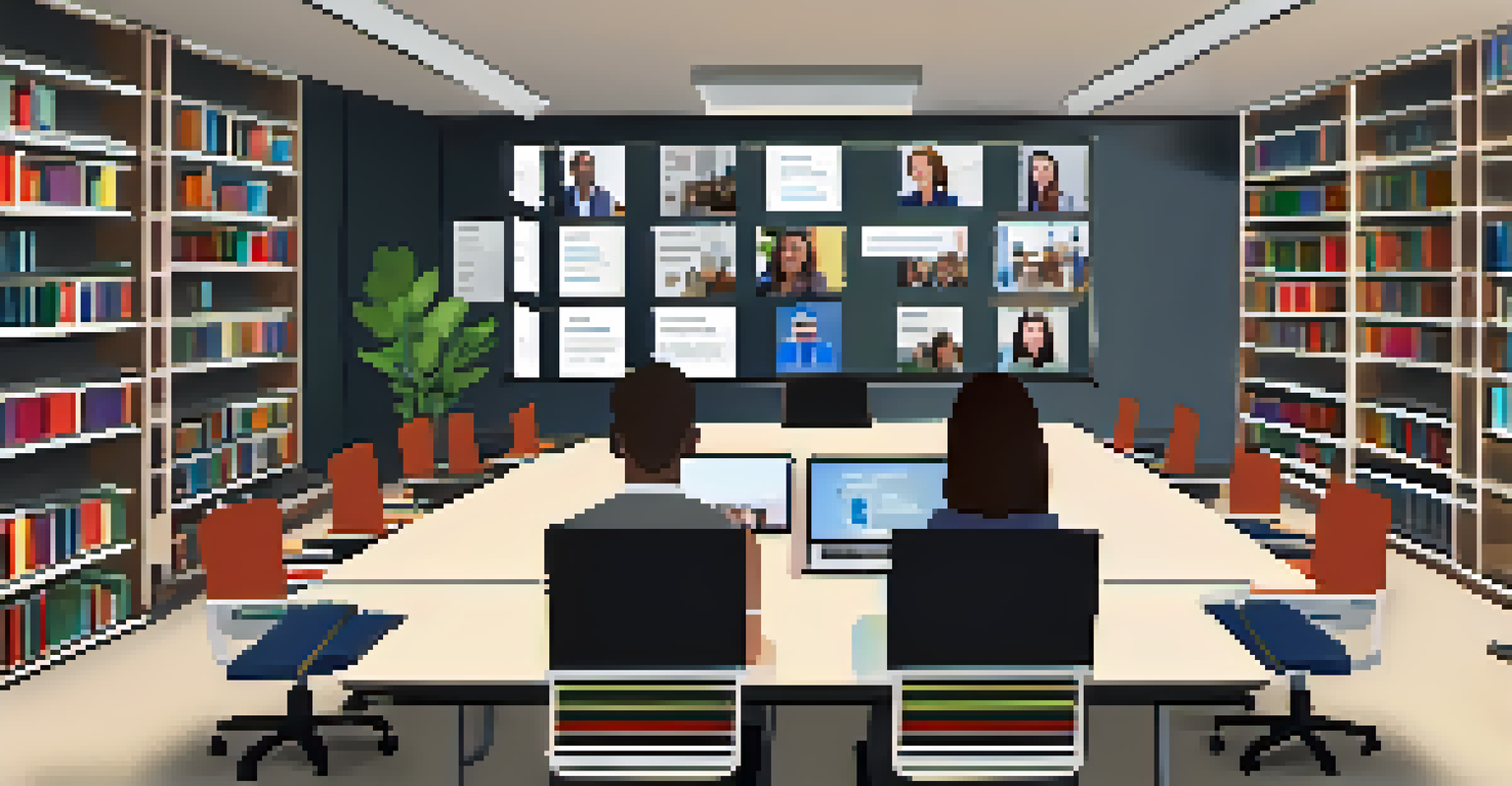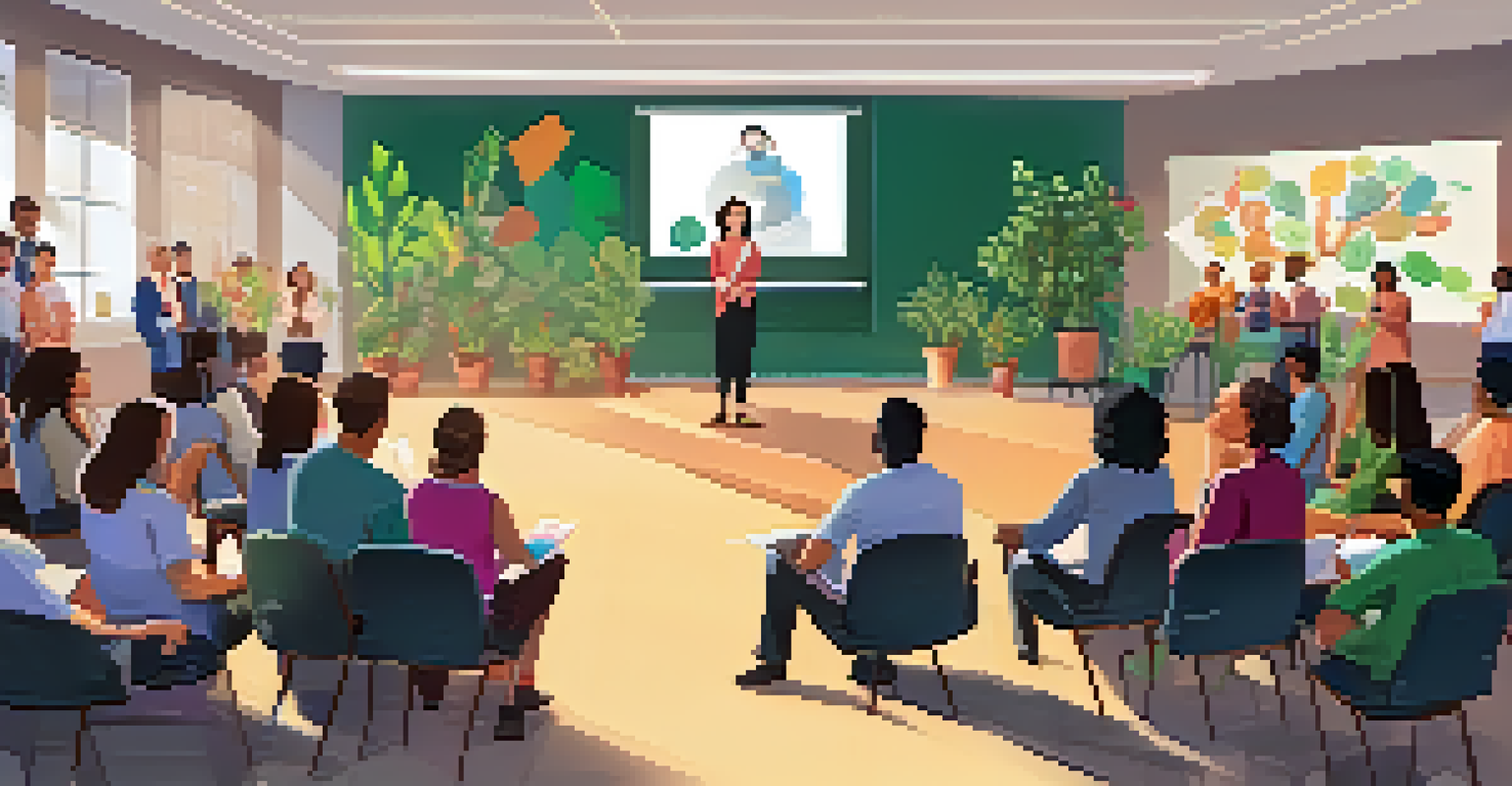Engaging Educators in Collaborative Professional Development

Understanding the Importance of Collaboration in Education
Collaboration among educators is crucial for fostering a supportive learning environment. When teachers work together, they can share insights, strategies, and experiences that enrich their professional practices. This collective wisdom not only enhances their teaching but also positively impacts student outcomes.
Alone we can do so little; together we can do so much.
Engaging in collaborative professional development allows educators to learn from one another, creating a culture of continuous improvement. It transforms isolated teaching practices into shared experiences, making each educator feel valued and connected. This sense of community can lead to increased job satisfaction and retention rates among teachers.
Moreover, collaboration encourages innovation in teaching methodologies. When teachers brainstorm and problem-solve together, they are more likely to experiment with new approaches. This willingness to take risks ultimately benefits students, as they are exposed to diverse teaching styles and perspectives.
Creating a Supportive Environment for Collaboration
To foster effective collaboration, schools must create an environment that supports open communication and trust among educators. This can be achieved by establishing norms and expectations for collaborative work, ensuring every voice is heard and valued. When teachers feel safe to express their ideas, they are more likely to engage in meaningful discussions.

Professional development sessions should be designed to promote teamwork and shared learning experiences. Activities such as peer observations, co-planning lessons, or participating in professional learning communities can help build strong relationships among educators. These initiatives not only develop professional skills but also strengthen the bonds within the teaching staff.
Collaboration Boosts Teacher Growth
When educators collaborate, they share insights and strategies that enhance both their teaching practices and student outcomes.
Additionally, providing time within the school schedule for collaboration is essential. Carving out dedicated time for teachers to meet, plan, and reflect together shows that the administration values their collaborative efforts. This commitment can lead to more productive and focused professional development.
Utilizing Technology to Enhance Collaborative Learning
In today's digital age, technology plays a pivotal role in facilitating collaborative professional development. Tools such as video conferencing, collaborative document editing, and online discussion forums can connect educators, even if they are miles apart. This opens up opportunities for diverse perspectives and experiences.
Collaboration allows us to know more than we are capable of knowing by ourselves.
For instance, educators can engage in virtual book clubs or online workshops that encourage discussion and resource sharing. Such platforms can help teachers stay informed about the latest educational trends and best practices while enabling them to learn from peers across the globe. This flexibility allows for a more personalized approach to professional development.
Moreover, utilizing technology can also streamline the feedback process. Educators can record lessons and share them with colleagues for constructive criticism, fostering a culture of continuous improvement. By embracing digital tools, schools can enhance collaboration and make professional development more accessible and engaging.
Encouraging Ownership in Professional Development
Empowering educators to take ownership of their professional development is vital for engagement. When teachers have a say in their learning goals and the types of professional development they pursue, they are more likely to be invested and motivated. This autonomy fosters a sense of responsibility for their growth.
Schools can support this ownership by offering a variety of professional development options, from workshops to self-directed learning opportunities. Allowing teachers to choose what resonates with them ensures that their professional growth aligns with their interests and classroom needs. This tailored approach can significantly enhance the effectiveness of professional development efforts.
Technology Enhances Collaboration
Digital tools like video conferencing and online forums allow educators to connect and learn from each other, regardless of distance.
Additionally, educators should be encouraged to share their learning with their peers. Whether through presentations, informal discussions, or collaborative projects, sharing successes and challenges creates a rich learning environment. This exchange not only highlights individual growth but also inspires others to explore new strategies.
Establishing Clear Goals for Collaborative Initiatives
Setting clear, achievable goals for collaborative professional development initiatives is essential for success. When educators understand the objectives of their collaboration, they can focus their efforts and measure progress more effectively. These goals should be specific, measurable, attainable, relevant, and time-bound (SMART).
For example, a school might aim to improve student engagement through collaborative lesson planning. By establishing this goal, teachers can align their efforts and evaluate the impact of their collaborative work on student learning outcomes. This clarity helps maintain momentum and fosters a sense of accomplishment as goals are met.
Furthermore, regular check-ins and reflections on progress towards these goals can enhance accountability. Creating a culture of reflection encourages educators to assess what is working and what needs improvement. This ongoing evaluation ensures that collaborative efforts remain focused and impactful.
Celebrating Successes in Collaborative Professional Development
Recognizing and celebrating successes in collaborative professional development is vital for sustaining motivation. Acknowledging individual and team accomplishments reinforces the value of collaboration and encourages educators to continue their efforts. Celebrations can range from shout-outs during staff meetings to showcasing successful projects on school websites.
Moreover, sharing success stories can inspire other educators to engage in collaborative practices. When teachers see the positive impact of collaboration on their peers and students, they are more likely to participate in similar initiatives. This ripple effect creates a vibrant culture of shared learning and growth within the school.
Celebrating Success Drives Engagement
Recognizing and celebrating achievements in collaborative professional development encourages educators to continue participating in shared learning.
Additionally, celebrating milestones can serve as a reminder of the collective journey educators undertake. Whether it’s achieving a specific goal or overcoming a challenge, these moments highlight the importance of teamwork and resilience. Recognizing these achievements fosters a sense of pride and belonging among educators.
Evaluating and Adapting Collaborative Practices
To ensure the ongoing effectiveness of collaborative professional development, regular evaluation and adaptation are necessary. Gathering feedback from educators about their experiences can provide valuable insights into what works and what doesn’t. This continuous feedback loop allows for adjustments that enhance future collaborative efforts.
Surveys, focus groups, and one-on-one discussions can help gather this feedback. By actively engaging educators in the evaluation process, schools demonstrate that their opinions matter and that their input shapes professional development initiatives. This approach fosters a sense of ownership and investment among educators.

Ultimately, adapting collaborative practices based on feedback ensures that professional development remains relevant and impactful. It allows educators to evolve with changing educational landscapes and student needs. By prioritizing evaluation, schools can create a dynamic, responsive professional development culture that benefits everyone.